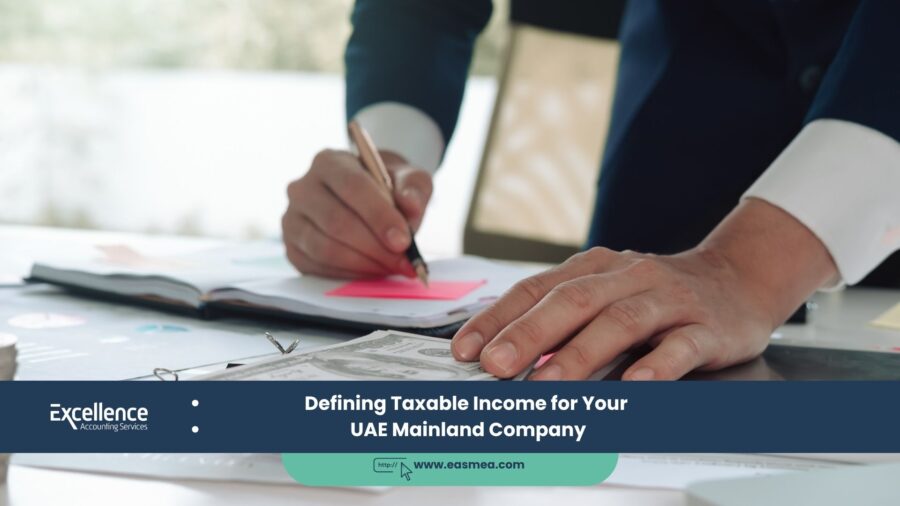Defining Taxable Income: The Ultimate Guide for Your UAE Mainland Company
The introduction of the UAE Corporate Tax has fundamentally reshaped the financial landscape for every Mainland business. While the headline rate of 9% on profits above AED 375,000 is straightforward, the critical question for every business owner and finance manager is: “What exactly is my taxable income?” The answer is not as simple as looking at the bottom line of your profit and loss statement.
- Defining Taxable Income: The Ultimate Guide for Your UAE Mainland Company
- The Calculation Journey: From Accounting Profit to Taxable Income
- How Excellence Accounting Services (EAS) Ensures Accurate Taxable Income Calculation
- Frequently Asked Questions (FAQs) for Mainland Companies
- Calculate Your Corporate Tax with Confidence.
Your “Taxable Income” is a specific figure calculated according to the rules and regulations of the UAE Corporate Tax Law. It begins with your accounting profit but is then modified by a series of prescribed adjustments—certain expenses must be added back, while specific reliefs and exemptions can be deducted. Getting this calculation wrong is not an option; it can lead to incorrect tax payments, FTA penalties, and a flawed understanding of your company’s true financial health.
This comprehensive guide is designed specifically for UAE Mainland companies. We will walk you through the precise journey from your accounting net profit to your final taxable income. We will cover the common pitfalls of non-deductible expenses, explain complex concepts like interest capping rules, and provide a clear roadmap for ensuring your calculations are accurate, compliant, and optimized. This is your essential resource for mastering the most crucial aspect of the new tax regime.
Key Takeaways
- Start with Audited Financials: Your starting point is the net profit as per your IFRS-compliant, preferably audited, financial statements.
- Not All Expenses are Deductible: The law disallows or limits the deduction of certain expenses (e.g., client entertainment, fines, specific donations) which must be added back to your profit.
- Understand Interest Capping: Net interest expenses are generally deductible only up to 30% of your EBITDA, a crucial calculation for businesses with significant debt.
- Related Party Transactions are Scrutinized: All transactions with related parties must be at “arm’s length,” and payments to them must be commensurate with the market value of the service or goods.
- Meticulous Record-Keeping is Mandatory: You must maintain all financial records and supporting documents for at least seven years to justify every figure in your tax calculation during a potential FTA audit.
The Calculation Journey: From Accounting Profit to Taxable Income
The core principle of the UAE Corporate Tax law is to use a business’s accounting net profit (or loss) as the starting point for determining taxable income. This underscores the importance of having robust and accurate financial records from day one.
The formula can be visualized as:
Taxable Income = Accounting Profit + Non-Deductible Expenses – Deductible Expenses (not already in P&L) – Exemptions & Reliefs
Step 1: The Starting Point – Your Accounting Profit
Your calculation must begin with the net profit figure as reported in your financial statements. The law mandates that these statements be prepared in accordance with International Financial Reporting Standards (IFRS). While not all Mainland companies are legally required to have an audit, it is highly recommended. Audited financials provide a credible, verified starting point for your tax calculation and lend significant weight to your position in the event of an FTA audit. Professional financial reporting is the bedrock of compliance.
Step 2: Add-Backs – Identifying Non-Deductible and Limited Expenses
This is where most of the adjustments occur. You must review your expense accounts and “add back” any amounts that are not fully deductible for Corporate Tax purposes. Common examples include:
1. Client Entertainment Expenses
Expenses related to entertaining customers, shareholders, suppliers, or other business partners are only 50% deductible. This includes meals, accommodation, event tickets, etc. You must add back the other 50% to your accounting profit.
2. Fines and Penalties
Any penalties or fines imposed by a government authority (e.g., traffic fines, VAT penalties, visa fines) are not deductible for tax purposes. The full amount must be added back.
3. Donations and Grants
Donations made to charities or institutions that are not listed as “Qualifying Public Benefit Entities” by the authorities are not deductible. You can only deduct payments made to organizations on this approved list.
4. VAT Paid
Recoverable VAT (the input credit you claim on your VAT return) is not an expense and should not be part of the tax calculation. Non-recoverable VAT, however, is a legitimate business expense and is deductible.
5. Bribes and Illicit Payments
As expected, any payments that are illegal under UAE law are strictly non-deductible.
6. Interest Expense Limitations (The 30% EBITDA Rule)
For businesses with significant borrowing, this is a critical rule. Your net interest expense deduction for a period is capped at 30% of your EBITDA (Earnings Before Interest, Tax, Depreciation, and Amortization), calculated for tax purposes. Any interest expense above this cap must be added back. However, this disallowed interest can be carried forward and potentially deducted in future years.
Step 3: Deductions and Reliefs – Reducing Your Taxable Base
After adding back non-deductible items, you can then deduct certain reliefs and incomes that are exempt from tax.
1. Exempt Income
Certain types of income are exempt from Corporate Tax and can be deducted from your accounting profit if they were included in it. This primarily includes:
- Dividends and Capital Gains: Income from a “Participating Interest” (generally, owning 5% or more of another company’s shares for at least 12 months) is exempt. This prevents double taxation within corporate groups.
- Foreign Permanent Establishment Profits: If your UAE company has a branch in another country and you have elected for this exemption, the profits of that branch are not taxed in the UAE.
2. Tax Loss Relief
If your business incurred a tax loss in a previous period, you can carry this loss forward and offset it against up to 75% of your taxable income in a future profitable period. This is a significant relief for startups and businesses in cyclical industries. A proper feasibility study and financial planning can help model this.
3. Business Restructuring Relief
The law provides relief to ensure that mergers, spin-offs, and other qualifying reorganizations can happen on a tax-neutral basis, provided certain conditions are met.
Precise accounting and bookkeeping is essential to track these adjustments. You must maintain clear schedules that reconcile your accounting profit to your final taxable income figure.
How Excellence Accounting Services (EAS) Ensures Accurate Taxable Income Calculation
Navigating the adjustments from accounting profit to taxable income requires deep expertise. EAS provides an end-to-end solution for Mainland businesses to ensure compliance and optimization.
- Corporate Tax Assessment & Filing: Our core UAE Corporate Tax service involves meticulously calculating your taxable income, preparing all necessary adjustment schedules, and filing your tax return accurately and on time.
- Audit and Assurance Services: We provide mandatory and voluntary external audits to ensure your financial statements form a compliant and credible base for your tax calculations.
- Bookkeeping and Account Reconciliation: Our team ensures your day-to-day records are flawless, making the year-end adjustment process seamless. We offer specialized account reconciliation services to guarantee accuracy.
- CFO & Advisory Services: Our CFO services provide strategic oversight, helping you structure transactions and business operations in a tax-efficient manner from the outset. We also assist with complex areas like due diligence and business valuation which have significant tax implications.
Frequently Asked Questions (FAQs) for Mainland Companies
Yes, provided it is a reasonable amount that reflects the fair market value for the work you are performing. The FTA will scrutinize salaries paid to owners and other “connected persons” to ensure they are not artificially inflated to reduce profit. You should have a formal employment contract and document your roles and responsibilities to justify the salary.
You can only deduct the portion of the expense that relates directly to business use. You must maintain clear records, such as a logbook for car mileage or itemized phone bills, to prove the percentage of business use. Deducting 100% of such costs without justification is a major red flag for auditors.
General provisions (e.g., “a provision of 2% of sales for bad debts”) are not deductible. However, specific provisions, where you can identify the specific customer who is unlikely to pay or the specific inventory item that is obsolete, are generally deductible. You need strong documentation to support specific provisions.
Yes. If you are an individual holding a freelance permit or a license for a sole proprietorship, your business income is subject to Corporate Tax if it exceeds the AED 375,000 profit threshold (and your total turnover exceeds AED 1 million). The same rules for calculating taxable income apply.
The accounting depreciation charged in your financial statements is the amount used for tax purposes. The UAE Corporate Tax law, for the sake of simplicity, does not prescribe separate “tax depreciation” rates. This makes the calculation more straightforward than in many other tax systems.
Your tax period will align with your accounting period. The Corporate Tax Law applies to financial years starting on or after June 1, 2023. So, if your financial year is April 1 to March 31, your first tax period would be from April 1, 2024, to March 31, 2025.
Yes, but you must have robust documentation. A simple cash payment receipt is often not enough. You should have a proper invoice from the supplier and be able to demonstrate the business purpose of the expense. The FTA scrutinizes large or unusual cash transactions, so it’s always better to use formal banking channels.
Yes, these are known as pre-commencement or formation expenses. They can be deducted over a period of time once the business starts trading. Proper record-keeping during your company formation phase is essential to be able to claim these costs.
The FTA will issue an assessment for the additional tax due, plus penalties. Penalties are typically levied for the late payment of tax and for filing an incorrect tax return. It is far more cost-effective to invest in getting the calculation right the first time than to pay penalties later.
The requirement is to submit the tax return itself via the EmaraTax portal. However, you must have your full, IFRS-compliant financial statements and all supporting documents ready for submission immediately upon request from the FTA. They form the basis of your declaration and will be the first thing an auditor asks for.
Conclusion: Precision is the New Profitability
For UAE Mainland companies, the era of treating accounting as a mere historical record-keeping exercise is over. Your financial data is now the direct foundation of your tax liability. Defining taxable income is a process that demands precision, expertise, and a proactive approach. By understanding the adjustments required, maintaining impeccable records, and seeking professional guidance, you can ensure not only full compliance with the law but also a clear and accurate picture of your business’s financial performance. In the new tax regime, compliant financial management is not just a cost center; it’s a strategic imperative.




